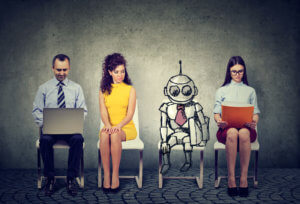If you believe the reviews then Netflix’s new series Altered Carbon will, to quote one critic, ‘blow your mind’. It’s a futuristic plot with artificial intelligence at the heart of it. The picture it paints may not materialise, but it challenges us to re-evaluate the things we now consider to be set in stone. Instead of asking ourselves what will change maybe we should be asking what will not change and embracing the challenge.
Everywhere you turn there’s a story about artificial intelligence and, given my professional interests, I find myself drawn to reports, research and academic papers on the consequences of artificial intelligence for society and employment.
and academic papers on the consequences of artificial intelligence for society and employment.
One study that recently caught my eye had found that artificial intelligence implementations were highlighting growth opportunities for businesses and allaying fears of job losses. Moreover, AI had created jobs. Among the gains were boosted sales, operational efficiency, a more engaged customer and highly prized insights. Music to every CEO’s ears.
It proves that artificial intelligence can bring benefits to how employees operate and the roles we play in an organisation. I’m a firm believer that the doomsayers who preach of low paid, low skills job losses are wrong – after all we have lived to tell the tale of Apple Macs, IBM computers, and Windows software.
Instead artificial intelligence can help people branch out and learn new skills and help an organisation move on to bigger and better things.
But I will agree that there will be job losses if we get the cultural environment for adopting artificial intelligence wrong. I therefore believe that as well as helping employees adjust their skill set, learn new ways in which they can add value and work with artificial intelligence not against it, we must also ensure people are happy to deal with the advent of change in the first place.
However, I know from experience, it takes a strong leader to embrace change and an even stronger one to encourage employees to adapt to change when the headlines shout of robots coming to steal jobs. But there are no two ways about it, if people don’t feel safe with the risk they perceive to be there, they won’t take the leap of faith.
In addition, people are going to need a new sort of interpersonal skill. For instance, if chat bots ‘will take over the world’ then employees who do interact with people, most likely when things go wrong, will need excellent listening, empathetic, and problem- solving skills.
We will also be doing different things. New jobs have already been created by the introduction of AI and I see a time when people will have jobs that don’t exist today. How do you prepare for this?
It’s argued by some that we need to overhaul the education system and put more emphasis on design thinking, creativity, analytics and programming. True but they still need to be able to apply it all to real-life. And as we know real-life doesn’t always go to plan.
This brings us full circle to the argument dealing with ambiguity, and the related skills of problem solving and developing relationships quickly will be an imperative skill as we journey into the fourth revolution. People must consider how they can continually evolve their skills as we compensate for the roles robots perform and the roles that only humans can perform – like make the storyboard decisions that will produce the latest Netflix hit.
I will add however that I think the social changes that we are witnessing among the younger generation are making preparing a workforce for dealing with ambiguity much harder . They learn differently, and leaders will have to realise one size can’t fit all. If they are to create a culture that is inspired by change they have to cater for all needs.
In some ways, I think there has to be a meeting of minds. Leaders must understand the fears of their people and get them involved in shaping the new world and their role in it. Guide them so that they don’t feel like they are under siege by change, but instead a steward of change, responsible for taking the company to new exciting places.
And employees need to be willing to adapt. Granted, some will adapt faster than others, but I believe that with the right encouragement everyone can find their place and make their contribution to an artificial world – whatever that turns out to be.

